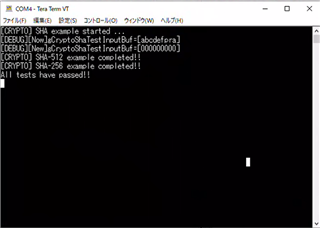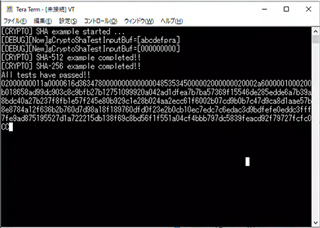Part Number: LP-AM243
Tool/software:
サンプル フォルダーの 'examples\security\crypto\sa2ul_sha' は 'abcdefpra' の SHA2-512 および SHA2-256 ハッシュ値を出力します。
この文字列を別の文字列に置き換えると、結果は 'abcdefpra' と同じハッシュ値になります。
ハッシュ値は置換された文字列のハッシュ値になると思います。
しかし、なぜ置換前と同じハッシュ値なのでしょうか?
使用したソースファイルを共有します。
/*
* Copyright (C) 2021 Texas Instruments Incorporated
*
* Redistribution and use in source and binary forms, with or without
* modification, are permitted provided that the following conditions
* are met:
*
* Redistributions of source code must retain the above copyright
* notice, this list of conditions and the following disclaimer.
*
* Redistributions in binary form must reproduce the above copyright
* notice, this list of conditions and the following disclaimer in the
* documentation and/or other materials provided with the
* distribution.
*
* Neither the name of Texas Instruments Incorporated nor the names of
* its contributors may be used to endorse or promote products derived
* from this software without specific prior written permission.
*
* THIS SOFTWARE IS PROVIDED BY THE COPYRIGHT HOLDERS AND CONTRIBUTORS
* "AS IS" AND ANY EXPRESS OR IMPLIED WARRANTIES, INCLUDING, BUT NOT
* LIMITED TO, THE IMPLIED WARRANTIES OF MERCHANTABILITY AND FITNESS FOR
* A PARTICULAR PURPOSE ARE DISCLAIMED. IN NO EVENT SHALL THE COPYRIGHT
* OWNER OR CONTRIBUTORS BE LIABLE FOR ANY DIRECT, INDIRECT, INCIDENTAL,
* SPECIAL, EXEMPLARY, OR CONSEQUENTIAL DAMAGES (INCLUDING, BUT NOT
* LIMITED TO, PROCUREMENT OF SUBSTITUTE GOODS OR SERVICES; LOSS OF USE,
* DATA, OR PROFITS; OR BUSINESS INTERRUPTION) HOWEVER CAUSED AND ON ANY
* THEORY OF LIABILITY, WHETHER IN CONTRACT, STRICT LIABILITY, OR TORT
* (INCLUDING NEGLIGENCE OR OTHERWISE) ARISING IN ANY WAY OUT OF THE USE
* OF THIS SOFTWARE, EVEN IF ADVISED OF THE POSSIBILITY OF SUCH DAMAGE.
*/
/* This example demonstrates the implementation of SHA */
#include <string.h>
#include <kernel/dpl/DebugP.h>
#include "ti_drivers_config.h"
#include "ti_drivers_open_close.h"
#include "ti_board_open_close.h"
/* SHA512 length */
#define APP_SHA512_LENGTH (64U)
/* SHA256 length */
#define APP_SHA256_LENGTH (32U)
/* Alignment */
#define APP_SHA_ALIGNMENT_FOR_BUF (128U)
/*Input and output buf length*/
#define APP_SHA_IN_OUT_BUF_LENGTH (9U)
/*Inout test buffer for sha computation */
static uint8_t gCryptoShaTestInputBuf[APP_SHA_IN_OUT_BUF_LENGTH] = {"abcdefpra"};
//static uint8_t gCryptoShaTestInputBuf[APP_SHA_IN_OUT_BUF_LENGTH];
/*Output test buffer for sha computation */
uint8_t gCryptoShaTestOutputBuf[APP_SHA_IN_OUT_BUF_LENGTH] __attribute__ ((aligned (APP_SHA_ALIGNMENT_FOR_BUF)));
/* SHA-512 test vectors,this is expected hash for the test buffer */
static uint8_t gCryptoSha512TestSum[APP_SHA512_LENGTH] =
{
0x1d, 0xa6, 0x8d, 0x60, 0x62, 0x9b, 0x61, 0xf4,
0xab, 0x16, 0x67, 0x77, 0x2a, 0x21, 0xae, 0x85,
0xbf, 0x5c, 0x20, 0xdf, 0x5c, 0x38, 0xcc, 0xa5,
0x29, 0xc6, 0xce, 0x09, 0x22, 0xbe, 0x15, 0x7f,
0x04, 0x9c, 0x22, 0x0a, 0xab, 0x85, 0xb4, 0x3c,
0x49, 0x66, 0x12, 0xfa, 0x12, 0xd5, 0x41, 0xac,
0x78, 0x50, 0x9a, 0x5f, 0x03, 0x4c, 0xc9, 0xcb,
0x64, 0x39, 0x0a, 0x74, 0x2a, 0xb6, 0xab, 0x43
};
/* SHA-256 test vectors,this is expected hash for the test buffer */
static uint8_t gCryptoSha256TestSum[APP_SHA256_LENGTH] =
{
0xC2, 0x77, 0xB1, 0x18, 0x8B, 0x34, 0xF5, 0x95,
0x3A, 0x50, 0xA5, 0x28, 0xE4, 0xD8, 0x68, 0x01,
0x14, 0xFB, 0xED, 0x82, 0x56, 0x85, 0x6D, 0xA2,
0xFD, 0x82, 0x35, 0xD5, 0x00, 0x71, 0x96, 0x6F
};
/* Context memory */
static Crypto_Context gCryptoShaContext __attribute__ ((aligned (SA2UL_CACHELINE_ALIGNMENT)));
/* Context Object */
SA2UL_ContextObject gSa2ulCtxObj __attribute__ ((aligned (SA2UL_CACHELINE_ALIGNMENT)));
void loop_forever(void)
{
volatile uint32_t loop = 1;
while(loop)
;
}
void crypto_sha(void *args)
{
int32_t status;
Crypto_Handle shaHandle;
SA2UL_ContextParams ctxParams;
Drivers_open();
Board_driversOpen();
DebugP_log("[CRYPTO] SHA example started ...\r\n");
shaHandle = Crypto_open(&gCryptoShaContext);
DebugP_assert(shaHandle != NULL);
/* Configure secure context */
ctxParams.opType = SA2UL_OP_AUTH;
ctxParams.hashAlg = SA2UL_HASH_ALG_SHA2_512;
ctxParams.inputLen = sizeof(gCryptoShaTestInputBuf);
gSa2ulCtxObj.totalLengthInBytes = sizeof(gCryptoShaTestInputBuf);
status = SA2UL_contextAlloc(gCryptoShaContext.drvHandle, &gSa2ulCtxObj, &ctxParams);
DebugP_assert(SystemP_SUCCESS == status);
//debug
// loop_forever();
DebugP_log("[DEBUG][Now]gCryptoShaTestInputBuf=[%s]\r\n",gCryptoShaTestInputBuf);
memset(gCryptoShaTestInputBuf,0x30,APP_SHA_IN_OUT_BUF_LENGTH);
DebugP_log("[DEBUG][New]gCryptoShaTestInputBuf=[%s]\r\n",gCryptoShaTestInputBuf);
//debug
/* Perform SHA operation */
status = SA2UL_contextProcess(&gSa2ulCtxObj,&gCryptoShaTestInputBuf[0], sizeof(gCryptoShaTestInputBuf), gCryptoShaTestOutputBuf);
DebugP_assert(SystemP_SUCCESS == status);
/*Function to free secure context configuration*/
status = SA2UL_contextFree(&gSa2ulCtxObj);
DebugP_assert(SystemP_SUCCESS == status);
/*comparing result with expected test results*/
if(memcmp(gSa2ulCtxObj.computedHash, gCryptoSha512TestSum, APP_SHA512_LENGTH) != 0)
{
DebugP_log("[CRYPTO] SHA-512 example failed!!\r\n");
}
else
{
DebugP_log("[CRYPTO] SHA-512 example completed!!\r\n");
}
/* Configure secure context */
ctxParams.opType = SA2UL_OP_AUTH;
ctxParams.hashAlg = SA2UL_HASH_ALG_SHA2_256;
ctxParams.inputLen = sizeof(gCryptoShaTestInputBuf);
gSa2ulCtxObj.totalLengthInBytes = sizeof(gCryptoShaTestInputBuf);
status = SA2UL_contextAlloc(gCryptoShaContext.drvHandle, &gSa2ulCtxObj, &ctxParams);
DebugP_assert(SystemP_SUCCESS == status);
/* Perform SHA operation */
status = SA2UL_contextProcess(&gSa2ulCtxObj,&gCryptoShaTestInputBuf[0], sizeof(gCryptoShaTestInputBuf), gCryptoShaTestOutputBuf);
DebugP_assert(SystemP_SUCCESS == status);
/*Function to free secure context configuration*/
status = SA2UL_contextFree(&gSa2ulCtxObj);
DebugP_assert(SystemP_SUCCESS == status);
/*comparing result with expected test results*/
if(memcmp(gSa2ulCtxObj.computedHash, gCryptoSha256TestSum, APP_SHA256_LENGTH) != 0)
{
DebugP_log("[CRYPTO] SHA-256 example failed!!\r\n");
}
else
{
DebugP_log("[CRYPTO] SHA-256 example completed!!\r\n");
DebugP_log("All tests have passed!!\r\n");
}
/* Close SHA instance */
status = Crypto_close(shaHandle);
DebugP_assert(SystemP_SUCCESS == status);
Board_driversClose();
Drivers_close();
return;
}


